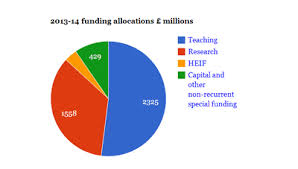Universities join hands with business to boost UK's economy

HEFCE
Sixteen UK universities will benefit from a £50 million investment in cutting-edged areas, UK Minister for Universities and Science David Willetts announced at the Higher Education Policy Institute spring conference earlier in May. The funding, allocated by the Higher Education Funding Council for England (HEFCE)’s Catalyst Fund, is intended to spur economic recovery in the UK and is directed at projects focusing on areas that the Department for Business, Innovation and Skills’ Technology Strategy Board has identified as priority.
The minister said, “Universities and colleges are vital to the UK’s economy. This extra £50 million will harness the potential for growth across the regions, focus on our world-class industrial sectors, and create a skilled workforce for the future. It will support cutting-edge innovation and research projects and keep us ahead in the global race.”
The 16 schemes selected for funding cover many areas identified by the UK government’s March 2011 Plan for Growth, including stimulating industrial strategy and the development of industrial technology, fostering local economic growth, attracting investment and increasing exports, and building an educated and flexible workforce that can be a driver of entrepreneurship. While facilitating innovation and growth within the UK, many projects simultaneous make use of existant partnerships or forge new ones around the world. For instance, in an “investment and exports” project, graduates of Lancaster University will work directly with 400 local small and medium enterprises to develop advanced low-carbon and digital manufacturing exports suited to the Chinese market, building on ties between the university and the Chinese Academy of Sciences as well as the local governments of Lancashire and Guangdong Province.
A press release by HEFCE detailed the total project economic impact of the estimated:
- £50.9 million in private sector match funding (in cash and kind)
- 535 new companies formed (graduate start-ups and spin-outs)
- 1,200 innovations (new products and processes)
- 3,120 jobs created (including high-value jobs and new graduate employment opportunities)
- £76 million in future additional research and development activity, and £2 million in future licensing revenue
- more than £3 billion Gross Value Added to the UK Economy.
Sir Alan Langlands, HEFCE Chief Executive, emphasized that “in addition
to the immediate growth opportunities, these projects provide a foundation for the long-term competitiveness of the UK economy. They address key issues, such as encouraging the interest of young engineers in high-value and advanced manufacturing, and they promote economic resilience through innovation, supporting high-growth potential in business. Critically, they also support the development of the next generation of entrepreneurs.”
The projects were evaluated and selected by a panel composed of members from the board of HEFCE, the panel of the Catalyst Fund, and the Technology Strategy Board.
The HEFCE distributes public funding for higher education to universities and colleges throughout the UK and ensures the proper implementation of the funds’ delivery. The Catalyst Fund tries specifically to foster partnerships in higher education to help institutions and students during the transition to new higher education funding arrangements and to achieve the government’s key policy objectives.
